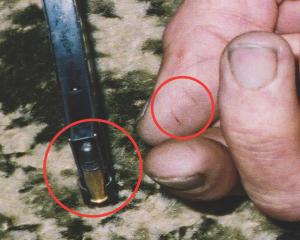The BSA said in two decisions released yesterday that The Investigator: The Case Against Robin Bain, which screened on TV One at 9.30pm in July, breached the fairness standard.
However, the BSA declined to uphold other aspects of complaints by three people - witness Daryl Young, David Bain supporter Joe Karam and Kapiti resident Simon Boyce - that the programme breached standards relating to accuracy, viewpoints and privacy.
In the programme, documentary maker Bryan Bruce re-examined the evidence against Robin Bain presented at his son David's retrial in 2009.
Bruce said he had doubts about Mr Young's testimony about his interaction with Robin Bain when selling him a photocopier as principal of Taieri Beach School.
Another salesman, interviewed by Bruce, said he had sold the photocopier and he was not aware of Mr Young visiting the school as many times as he said he did.
A former teacher at the school was also interviewed and her answers contradicted Mr Young's evidence.
After his interview with the teacher, Bruce phoned Mr Young on a Saturday morning to discuss his court testimony.
During the call, which was recorded, Mr Young said he did not want to discuss his evidence.
When asked if the other salesman had sold the photocopier to Robin Bain, Mr Young said: "Well, that's inaccurate. It went through in his name, but I sold it."
Shortly afterwards, Mr Young made it clear he did not want to talk and hung up, "which is a pity, because now we have two versions of the events, and I can't tell you who's right, and who's wrong," Bruce said.
Mr Young complained the programme breached standards relating to balance, accuracy and fairness.
He considered Bruce had "ambushed" him by phoning him on a Saturday morning, while he was at home with his children.
No attempt was made to follow up Bruce's phone call with a second call or in writing, Mr Young said.
Mr Young said he was devastated he had been portrayed as giving untrue evidence without an opportunity to defend himself and that everything he said in evidence at the trial "was true to the best of my knowledge and belief".
In response, TVNZ said Bruce had wanted to meet Mr Young to discuss the information he had obtained but Mr Young declined.
However, the programme had included a recording of the phone conversation, including Mr Young's reaction to the other salesman's claim that he sold the photocopier.
The broadcaster emphasised that having presented Mr Young's evidence, the sales documentation, the conflicting accounts of the other interviewees and Mr Young's response to them, Bruce did not try to reconcile those accounts.
The BSA found the programme had raised serious issues about Mr Young's testimony.
It acknowledged Bruce did not expressly state that Mr Young had given false evidence, but considered that most viewers would have been left with that impression.
"TVNZ needed to ensure that Mr Young was fully cognisant of what the programme might say about him, and understood the implications of his refusing an interview. We do not think this was achieved by a single phone call to Mr Young's home on a Saturday morning."
At least one more approach should have been made in writing to give Mr Young an opportunity to think about the allegations and form a response, the BSA said.
TVNZ was ordered to pay Mr Young $1500.





